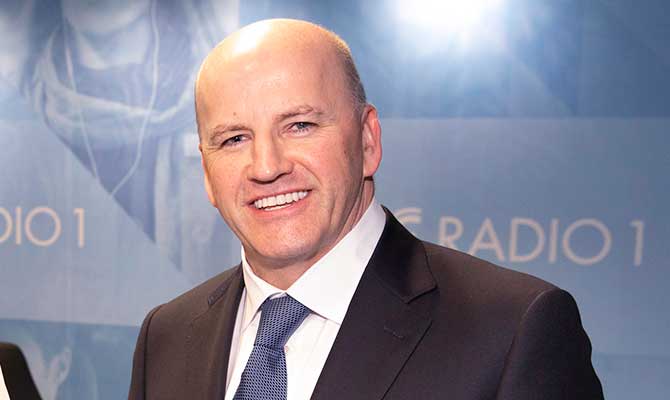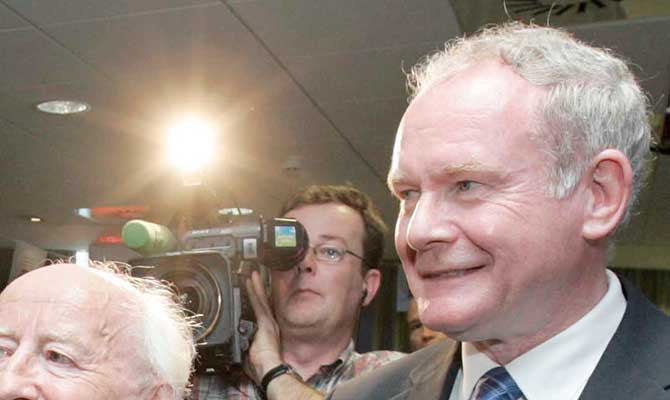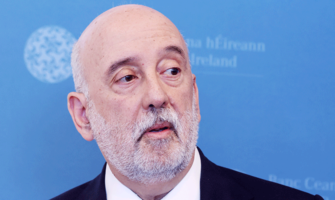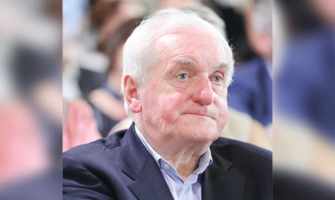
Liadh Ní Riada MEP
THERE ARE those in Sinn Féin who believe that the party’s presidential bid via Liadh Ní Riada, daughter of iconic Irish composer Seán Ó Riada, is an inspired move that could see her outflank the two main parties that have cried off hurt. But there are dangers involved in this effort to steal a march on Fine Gael and Fianna Fáil, namely that she could fail to increase or even equal the vote that Martin McGuinness won in 2011.
Some, but not all, SF activists are enthusiastic about the presidential campaign, pointing to the clear field left open by FG and FF. Ní Riada’s campaign, SF strategists argue, will raise the profile of the party. Her cultural background as an Irish speaker and TV producer; her southern, female status; and her relatively youthful image will combine to provide a real challenge to both Higgins and the supposed main challenger, Seán Gallagher. The Cork woman will also raise the party’s push for a border poll and a United Ireland in what they see as a golden opportunity to promote the raison d’être of SF.
The potential downside is that this is a badly thought through initiative that could see Ní Riada fail to compare with the towering figure that was the late Martin McGuinness and fall short of his 13.7% first preference vote in 2011. Even that vote was a minor disappointment for a party that polled 13.85% in the general election just over four years later.
But if McGuinness fell just short of the party’s general election vote, a poor campaign by Ní Riada runs the risk of the party polling significantly less than the party’s current ratings in the high teens or 20%.
There is an even greater danger, specifically, that the party will lose €200,000 in election reimbursements that can only be received if a candidate secures 12.5% or just over the quota in a presidential contest on the candidate’s last count. One presumes that Mary Lou McDonald and the party leadership are confident their candidate will exceed this threshold, but not many political pundits and activists are convinced this will happen.
It is not as though Ní Riada was the overwhelming choice of the SF membership in the first place. A strong cohort of northern members, especially in Belfast, put pressure on solicitor John Finucane, son of murdered solicitor Pat Finucane, to put his name forward. A significant number of southern members also supported the nomination of Finucane, who impressed mightily when he stood in the DUP-dominated constituency of north Belfast, failing to win the Westminster seat but emerging as a new and coming force within SF.
The argument was that 38-year-old Finucane, while a virtual unknown in the Republic, was the most impressive, articulate personality on offer and would do well in a national election campaigning on broad Republican and national issues.
Presidential elections are not about budgets or the health service, but more about the vision and how the First Citizen represents the country. Many in SF believed that Finucane’s impressive persona would see him breaking down partitionist resistance to a northerner ‘coming down here’, in the manner of Martin McGuinness seven years ago.
Senior SF members angrily deny it now, but northern SF figures did not pull back from nominating Finucane; rather, it was the other way round as the young lawyer and fledgling political activist felt a presidential bid was too much, too soon, for him. If Finucane had accepted the nomination, it is likely that he would now be the candidate as personalities like Pearse Doherty and Matt Carthy were backing him in the south and Mary Lou McDonald – whose links with Belfast are still central to her power base and leadership – would have had to go along with that choice.
‘A BIG ASK’
There were of course those who claimed the candidate had to be a southerner and a female one at that. But even on these terms, Tralee councillor Toiréasa Ferris, daughter of Martin Ferris TD, was regarded internally as a natural presidential candidate and there were those who would have plumped for her ahead of Ní Riada. However, Ferris is SF’s nominated Kerry candidate to succeed her father at the general election and she refused to go for the presidential nomination.
So, too, did Caoimhghín Ó Caoláin TD, who received much unsolicited support from party structures along the border.
There is some irony here as Toiréasa Ferris ran an impressive campaign in the three-seat South constituency in the 2009 European election, coming in third on the first count, but eventually failing to take a seat due to transfer resistance. Come the 2014 Euro election and Ferris faced heavy pressure to stand again but, with her children then still young, she declined.
This was when Ní Riada stepped up to the plate in a brave move, given that even the then SF President, Gerry Adams, described her bid for a seat as ”a big ask” following her selection convention. However, a strong wind gathered behind SF and Ní Riada took a seat as the party vote increased in the EU South constituency from Ferris’s 13% in 2009 to 19% for Ní Riada.
This was more or less in line with a surprisingly strong Euro vote for SF in the Republic (19.5%) and, while it was the SF brand that was mainly responsible for her victory, Ní Riada ran a credible campaign.
Ní Riada is an accomplished TV producer and has worked for RTÉ and TG4 down the years. Steeped in Irish music – her father, Seán Ó Riada, hardly needs introduction – as well as the Irish language and living in the Muskerry Gaeltacht in north west Cork, her cultural pedigree is substantial.
Because of this Irish arts background – and in another political irony – she has been a friend of President Michael D Higgins for many years. It was the then arts minister, Higgins, who appointed her to the board that created TG4 in 1996. In the same period she produced a documentary on the original Earth Summit in Rio in 1992, in which programme Higgins was prominently featured as he had attended the gathering. Ní Riada let it be known before accepting the SF nomination that she was a little reluctant to go up against Higgins given their friendship.
That friendship was based on Irish culture not politics and those who knew her in those days describe her as non-political. She was not a member of SF when she applied for the job of Irish language officer in 2011 and her political conversion is an indication of the broadening appeal of the party since the recession and consequent austerity.
DILIGENT WORK

Sean Gallagher
Ní Riada’s own childhood was marred by the early deaths of both parents and her statement that she and the other children were reared in poverty is no poor-mouth claim. The seven siblings clawed back a measure of recompense when the state and University College Cork coughed up a cool €1m for their father’s archives in 2005 (see The Phoenix, 11/3/05) although this hardly compensates for a deprived childhood.
Ní Riada’s EU record is one of diligent if unexciting work, especially in fighting for reform of EU fisheries policy, which she has continually critiqued as detrimental to Irish fishing interests. She is the only Irish member of the EU parliament’s committee on budgets and is also a member of the culture and education committee. Little of the dreary and thankless EU committees’ work gets mentioned in the national media, but fisheries policy means a lot in Munster’s coastal areas and along the rest of the coast line – something that has helped her to build a profile of sorts since her election.
In 2011, former IRA leader and northerner Martin McGuinness was regarded with relative warmth by the southern media and electorate who could not deny his authority and charisma. But no SF personality, north or south, could compare with McGuinness or Adams in this sense; not then and not now.
Despite her southern, female persona and her immersion in Irish culture, Ní Riada is unlikely to command the same attention as either of the two northern gents. And while her age (51), gender and geography – even the elimination of her own political party on election posters and her emollient line on issues like that of Máiría Cahill – is intended to broaden Ní Riada’s appeal, such dilution of the fundamental Republican message could result in a loss of hard core, traditional support.
Alternatively, while her significant cultural pedigree and identity is a distinguishing feature, she may suffer by comparison with the overpowering, aesthetic verbosity of Michael D.
If Higgins proves impossible to beat, the real test for SF and Ní Riada is to come ahead of Seán Gallagher, who is regarded as the only potential challenger to the incumbent president.
However, Gallagher’s ability to repeat his sensational 2011 performance, when more than one poll showed him on course to actually win the presidency – before the RTÉ tweetgate catastrophe – is by no means certain. In 2011, Gallagher came over as an articulate businessman with positive energy and an appeal to Middle Ireland during the height of the recession. He also came over as the ‘provisional’ Fianna Fáil candidate, which gave him an immediate block of the electorate with anything up to 20% of the vote.
History does not usually repeat itself in anything but tragedy or farce, as the man said, although Gallagher has, by and large, played it shrewdly so far, helping to ensure there is a crowded field of candidates who he hopes will collectively eat into Higgins’s support base.
Higgins showed up at an intimidating 67% in a recent Red C poll, with Gallagher on just 15% and Ní Riada on a low 7%, although she had not been ratified as SF’s candidate at that point. Gallagher had then been in the public eye as championing an election with as many candidates as possible and seeking county council nominations rather than actually campaigning as a contestant.
But while it is early days, the fact that he polled over twice Ní Riada’s rating is a worrying sign for SF as is ‘dragon’, Gavin Duffy’s 6%, most of which will go to Gallagher if there is a second count.
APPEAL

Martin McGuinness
Ní Riada’s strengths as a thoughtful, cultured politician rooted in an Irish tradition, which has more appeal than most of the media realises, may or may not unfold as the blood sport known as the presidential campaign develops. Privately and in small company, Ní Riada comes over as intelligent and amicable, but she tends to be defensive and even testy when confronted with aggressive journalists – and she will meet many in the next few weeks.
It is not possible to say if Higgins will retain his massive lead or if Gallagher’s vote will increase to the point that he can challenge the president. But if Ní Riada remains behind Gallagher on the first count, she could be in trouble as most transfers from candidates Duffy and Peter Casey and much of Joan Freeman’s will likely go to Gallagher.
The real issue then will be whether Ní Riada can reach 12.5% or higher before she goes out of the election, thus saving SF from a hefty €200,000 hit. It may be that Mary Lou and others believe that, as McGuinness ended up with almost precisely the core SF vote in 2011, they can at least bank on this percentage again.
If Gallagher can bank on a sizeable proportion of FF voters, Ní Riada does have a serious support base in Munster, particularly in populous Cork City and county, and she can probably rely on securing most of the party vote nationally. If Seán Ó Riada’s daughter can show her best side and not get bogged down in difficult issues like the Disappeared and the northern Troubles, her strengths could become apparent as the campaign develops, although she has already been damaged by contradictory remarks about the HPV vaccine. But everything depends on whether she can match Gallagher on the first count.
The real problem for Ní Riada is not that she is an inferior candidate, but rather that the presidential bid itself could turn out to be a dubious project no matter who the candidate is. Some SF members privately describe it as a top-down leadership project, which was not properly thought out, much less discussed with the membership in advance.
SF BRAND
The leadership is now attempting to mobilise and enthuse its normally very active membership in a campaign that not everybody believes is a good idea.
SF’s current poll ratings may mean that the SF brand name will sweep her past Gallagher. The Behaviour & Attitudes Sunday Times poll unadjusted figures show that SF were six points behind FF in January, but just one behind in April. In May, SF were at 26% with FF on 22% and this four-point gap remained until September, when SF were two points ahead of FF (26 to 24). (Unadjusted figures are raw figures before weightings – always negative in SF’s case – are applied). SF’s unspoken target is 20% of the first-preference vote but, while something near to this may be a realisable goal in a general election, the unpredictable personality traits and vagaries of a presidential contest – Gallagher in particular – could easily upset calculations.
Whatever happens later this month, Ní Riada’s profile will have been raised and she will likely walk back into the EU Parliament, especially as the Ireland South constituency goes up from four seats to five. Alternatively, SF might strike into her own Dáil constituency of Cork North-West, where the party is dwarfed by FF (two seats) and FG in this three-seater in the hope that she can take out FF’s Andreas Moynihan.




















